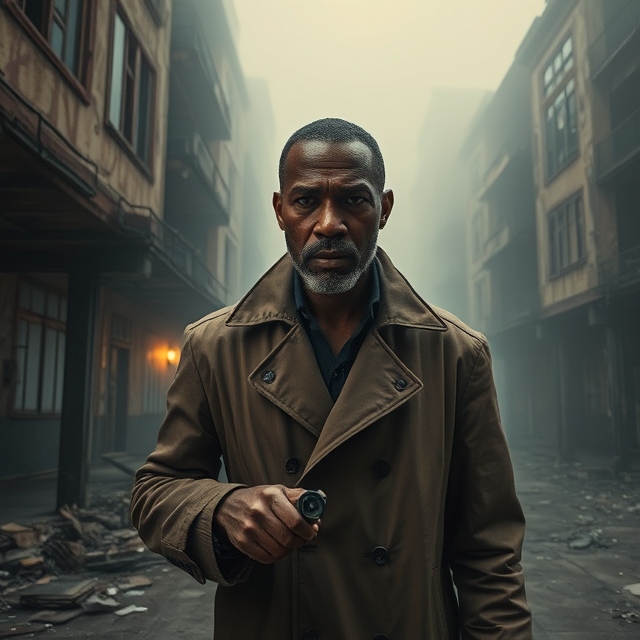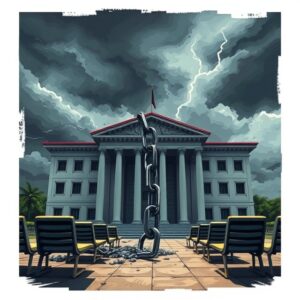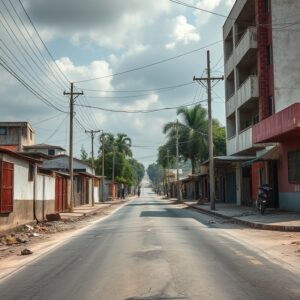The Silent Scream: Unsolved Crimes of Efuru Estate

Detective exploring abandoned buildings of Efuru Estate under dim morning light.
The Silent Scream: Unsolved Crimes of the Abandoned Efuru Estate
The sound came at exactly 3:27 a.m. It wasn’t loud, but it pierced through the silence, sharp and clear—the sound of a low, strained cry, as if someone had been trying to call for help for too long.
The neighborhood had been quiet for weeks. Efuru Estate was a sprawling complex of half-finished buildings and eerie alleyways—a maze that had become abandoned years ago. What had once been a vibrant residential area was now a forgotten ghost town. The properties had fallen into disrepair, their once-colorful walls faded and peeling, windows shattered by time and scavengers. No one lived there anymore, except for rumors.
The rumors were always the same: strange happenings, disappearances, unexplained noises. Many locals whispered of bodies that had been found near the estate and of shadowy figures seen at odd hours, walking through the winding streets. Most dismissed the stories as exaggerations—paranoia brought on by poverty and uncertainty. But tonight, those whispers felt real.
Emeka had been an early riser, even in uncertain times. His small kiosk sat just a few blocks from the estate. He was preparing his small table of goods when he thought he saw something—or someone—moving in the misty shadows at the end of the main access road. His hand froze as he tried to make sense of the figure.
The figure wasn’t clear at first. It was a man—or maybe several men—walking at an unnatural pace. But then, they weren’t walking. They were… shifting. The shadows darted from corner to corner, a series of movements that Emeka couldn’t explain. His hands trembled slightly as he clutched the small bag of biscuits he planned to sell that morning.
He wasn’t sure whether it was his imagination. But when he looked again, they were gone. Just silence.
The first report came hours later when the morning light began to hit the horizon. A local teacher, Ngozi, had found her neighbor’s child missing. She had been sleeping just a few streets from Efuru Estate. When she awoke, her neighbor had knocked on her door, frantic. Their child had vanished without a trace the previous night. They could only guess as to where the child had wandered during the dark hours.
By the time the police were called, suspicions had already turned toward Efuru Estate. This wasn’t the first incident of sudden disappearance tied to the area. Nearby residents mentioned seeing shadows in the mist near the old, decrepit buildings. Each time the stories came back, they became harder to ignore.
Detective Chijioke was among those investigating. His days had grown heavier over the years, with too many unsolved mysteries and cold trails. The moment he stepped into the misty outline of Efuru Estate, the air felt colder. It wasn’t the cold from nature, but a quiet, pressing tension that seemed to emerge from the estate itself.
The first houses they checked were broken, mostly without doors and windows. Investigators combed the abandoned buildings for signs of forced entry, evidence of violence, or clues of any kind. But there was nothing. The buildings only had their shadows, cobwebs, and layers of dust.
A retired resident of the area, a man named Chijioke Okonkwo, offered testimony to the police about the history of the estate. Chijioke recounted that the Efuru Estate had been a haven for thousands of families in its prime. However, the estate had fallen into obscurity when businesses shifted away and residents struggled financially. Slowly, they moved out, and no one moved in.
Chijioke’s voice was low, shaky as he told his story. He remembered the days when Efuru Estate was filled with children and the sound of vendors. But he also recalled that a series of armed robberies in the area had led to panic. One by one, families moved out, and eventually, no one remained. The settlement turned into a place for rumors—and sometimes, disappearances.
The police struggled to find leads, though they did everything they could to search every dark corner of the estate. Chijioke’s words lingered with Detective Chijioke as he recalled the number of reported disappearances over the last decade.
But there was something else. They weren’t just random disappearances. A thread connected them, something that hinted at a pattern: strangers in the night, groups seen walking toward dark alleys, figures vanishing without a trace. It felt deliberate, organized. A series of deaths without resolution.
In an attempt to trace these disappearances, the police decided to set up surveillance in nearby areas surrounding Efuru Estate. What they found sent shivers through their ranks. A man—likely a scavenger—had been seen on camera entering one of the half-collapsed buildings near the heart of the abandoned estate. His movements were jerky, unnatural, as if being pursued or afraid.
Moments later, a blur passed behind him. By the time the footage was reviewed, the man was gone. His belongings were left, scattered. His name was not recovered, nor was his body.
The investigation took on new weight. As suspicions grew, the police were forced to speak to locals who had previously avoided them. These residents described strange noises: laughter at odd hours, footsteps following footsteps, untraceable murmurs. Some swore that they had seen figures at certain corners of the mist-heavy streets.
The reports were fractured and contradictory, but they all pointed to something unspoken: there was something within the estate. And it was as if it fed on those who got too close.
Days later, a search team returned to Efuru Estate, bringing equipment meant to trace footprints, fingerprints, or other signs of life. But they found nothing. Some researchers suggested the possibility of occult practices—rituals, sacrifices, secret cults—that could explain these vanishing acts.
But even this offered no answers. What could have driven such fear into these empty streets? What force could haunt an entire settlement for years without any explanation?
These questions remained as Detective Chijioke spoke with other investigators and compiled case notes. Their findings suggested no human cause, no identifiable criminals, but something much darker. Perhaps it wasn’t just greed or poverty driving these events. Perhaps it was a ghost—though the rational among them would never admit it.
The answers slipped through their fingers. Every clue they found was either inconclusive or led them in circles.
Over the months, the investigations stopped. New theories had come and gone, media coverage waned, and life moved on. But for those close enough to hear the cries—those brief, hushed sounds during the dead hours—the fear never ended.
The investigations closed without resolution. Efuru Estate remains a hushed whisper in the conversations of those who remember. It stands abandoned, forgotten, but alive with stories, memories, and echoes of crimes never solved.
And in the stillness of the early morning, when the mist rises again over the cracked and broken concrete, it is as if the estate itself is listening, waiting.
Waiting for the next scream.
No answers came, and no one returned to the abandoned buildings. The estate sits still, a forgotten monument to a series of unsolved crimes and unanswered questions.
But maybe that is just the way it will stay.







